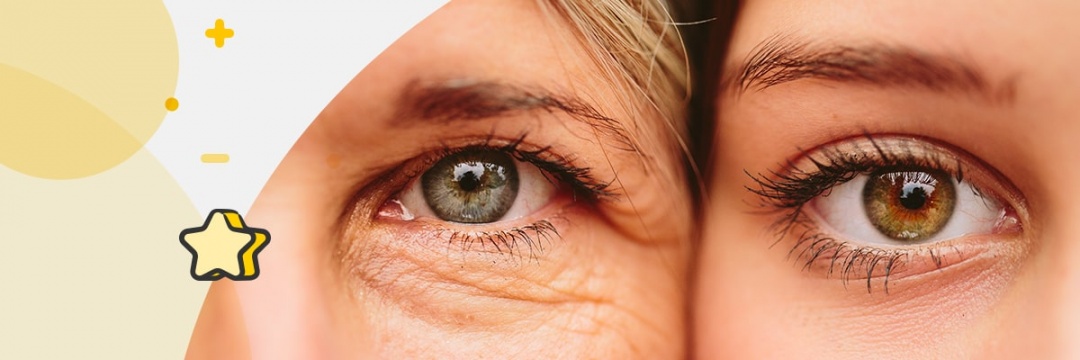Diabetes can affect the body in many ways. When you’re paying so much attention to your blood sugar levels every day, it’s easy for things like skincare, foot care and eye health to slip your mind. Keeping an eye on your, well, eyes, is super important when you’re living with diabetes. Keep on reading to find out how diabetes affects the eyes and how you can maintain good eye health.
How and why does diabetes affect the eyes?
When you think about diabetes, the first things that come to mind are probably words like pancreas, blood sugar, insulin and glucose. The effects of diabetes don’t stop there, however. Because diabetes is a systemic disease, the body’s systems - such as the heart, eyes, kidneys, oral cavity, nerves, and blood vessels - can become damaged. A systemic disease is one that affects the entire body, rather than a single organ or body part. Over time, high blood glucose levels can damage the body's organs. It’s important to keep these long term effects in mind as they can develop and become more serious.
When it comes to the eyes, there are a number of complications that can be caused by diabetes. The retina is the part of the eye that needs a constant supply of blood. A healthy retina is essential for good vision. The retina receives blood through a network of blood vessels which can be damaged as a result of persistently high blood sugar levels. This type of damage to the eye can lead to more serious problems down the line:
- Retinopathy is when the blood vessels in the retina become damaged and eventually affect the vision. In extreme cases, retinopathy can cause blindness. In its early stages, there are usually no symptoms. Diabetic retinopathy is the most common cause of vision loss in people with diabetes.
- Glaucoma describes the pressure of the fluid within the eye building up to a higher level than is healthy. This pressure can damage the eye over time. Diabetic retinopathy can promote the development of secondary glaucoma.
- With cataracts, the lens of the eye becomes cloudy and can cause vision to become blurry, distorted or sensitive.
- Macular oedema is a condition where the blood vessels in the retina are damaged, causing a build up of fluid and a part of the retina to swell. Macular oedema can also result in blurry, damaged vision.
Although these complications sound scary, try not to panic. We want to help you, not freak you out! When it comes to the problems listed above, the best method of prevention is to detect them early on. By keeping control of your blood sugar and attending regular eye check-ups, you can reduce your chances of developing serious eye problems in the future.
How common are diabetes related eye problems?
Many people living with diabetes will experience eye problems. In fact, around one in three people with diabetes over the age of 40 already have some signs of diabetic retinopathy. What’s more, people with diabetes are more than twice as likely to develop either glaucoma or cataracts compared to people without diabetes.
As the number of diabetes diagnoses continues to rise worldwide, so do instances of diabetic retinopathy. A study that examined regions of the world over the past 20 years showed that South Asia, the Middle East, North Africa, and West Sub-Saharan Africa played host to the highest number of people that have been visually impaired by diabetic retinopathy. Worldwide, an estimated 17 million people with diabetes have diabetic retinopathy.
How can eye problems be prevented?
Tip #1: Keep your blood sugar in check
Staying on top of your diabetes and keeping it controlled as best you can is key when it comes to lowering your risk of eye problems. We bet you’re already working hard to keep your blood sugar levels in range. Keep on taming the diabetes monster to avoid more serious complications in the future.
Tip #2: Self care
Be sure to practice regular physical activity, eat a balanced diet and follow the advice of your healthcare team. Having high blood pressure or cholesterol as well as diabetes can also increase the risk of eye problems, so it’s important to keep your health in check.
Tip #3: Regular check ups
Attending regular healthcare check ups is an important part of life for people with diabetes, and regular eye exams are no exception. Most eye conditions don’t show symptoms in their early stages and an eye exam is the only way to detect a problem. Once a problem has been identified early on, steps can be taken to prevent the eye from becoming any more damaged. If you’re a person living with diabetes, be sure to get your eyes checked at least once a year.

References
- Roche, 2018. Diabetic macular edema. [webpage] Available at: https://scopeblog.stanford.edu/2014/05/08/new-research-keeps-diabetics-safer-during-sleep/ [Accessed 22/08/2021].
- NHS, 2018. Diabetic Retinopathy. [webpage] Available at: https://www.nhs.uk/conditions/diabetic-retinopathy/ [Accessed 22/08/2021].
- Shukla, U.V., Tripathy, K., 2021.Diabetic Retinopathy, [online]. Available at: Diabetic Retinopathy - PubMed (nih.gov)
- Medline Plus, 2020. Diabetes Eye Exams. [webpage] Available at: https://medlineplus.gov/ency/patientinstructions/000323.htm [Accessed 22/08/2021].
- Leash, A.L. et al, 2016. Global Estimates on the Number of People Blind or Visually Impaired by Diabetic Retinopathy: A Meta-analysis From 1990 to 2010. [online] Available at: Global Estimates on the Number of People Blind or Visually Impaired by Diabetic Retinopathy: A Meta-analysis From 1990 to 2010 | Diabetes Care (diabetesjournals.org) [Accessed 22/08/2021].
- Pandova, M.G., 2019. Diabetic Retinopathy and Blindness: An Epidemiological Overview. [online] Available at: Diabetic Retinopathy and Blindness: An Epidemiological Overview | IntechOpen
The mySugr website does not provide medical or legal advice. mySugr blog articles are not scientific articles, but intended for informational purposes only.
Medical or nutritional information on the mySugr website is not intended to replace professional medical advice, diagnosis or treatment. Always consult a physician or health care provider with any questions you may have regarding a medical condition.





